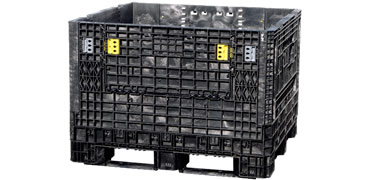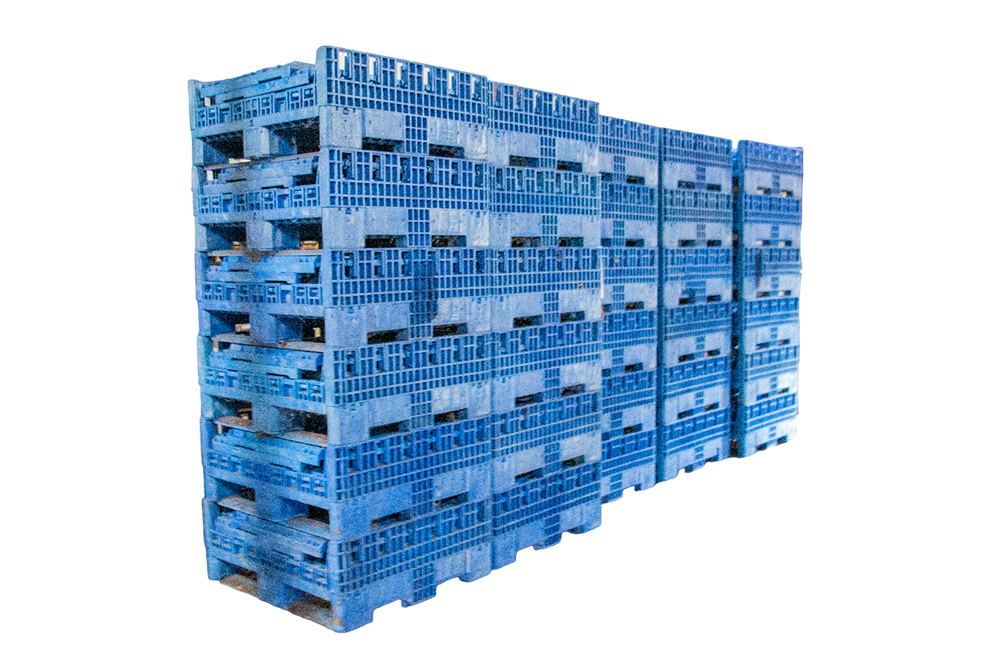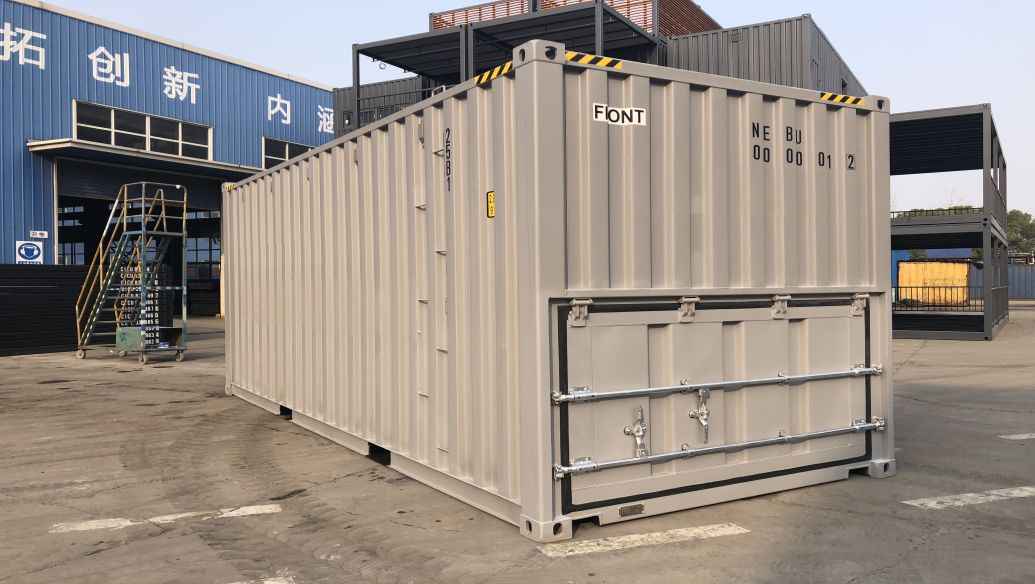Why Bulk Containers Are Vital for Sustainable and Cost-Effective Transport
Mass containers play an essential role in modern logistics. They facilitate the efficient movement of huge amounts of products, therefore enhancing transport processes. This technique not only decreases costs but additionally lessens environmental influence with reduced discharges and waste generation. As sectors look for more lasting techniques, the fostering of bulk containers is becoming significantly significant. What ramifications does this change hold for future logistics and supply chain monitoring?

The Advantages of Utilizing Mass Containers in Logistics
Bulk containers change logistics by improving effectiveness and sustainability. These containers permit the transportation of large quantities of items in a solitary journey, substantially decreasing the variety of trips called for. This not just simplifies operations however also decreases labor expenses connected with handling, loading, and discharging. On top of that, bulk containers are designed to enhance space usage within transportation cars, guaranteeing that even more products can be shipped all at once.
The standardization of mass containers likewise simplifies the logistics process. With consistent measurements, they can be conveniently stacked and kept, bring about boosted stockroom management. In addition, bulk containers frequently feature durable products that protect components from damage throughout transit, thereby reducing product loss and boosting overall dependability. As a result, services can experience enhanced supply chain efficiency, eventually causing increased success and client fulfillment. This mix of variables makes mass containers a vital asset in contemporary logistics.
Ecological Impact: Reducing Waste and Carbon Footprint
As sectors increasingly prioritize sustainability, the adoption of bulk containers has become a crucial technique for lowering waste and decreasing carbon impacts. These containers lessen using packaging products, such as boxes and plastic, thereby notably lowering overall waste generation. By combining shipments, mass containers enhance transport performance, permitting even more products to be carried per journey. This reduction in trips straight correlates with reduced greenhouse gas exhausts, adding to a smaller carbon footprint.
In addition, mass containers can often be recycled or recycled, additionally mitigating ecological influence. The longevity of these containers warranties they can stand up to numerous transportation cycles, reducing the need for single-use choices. used plastic containers. By improving logistics and promoting reliable resource usage, mass containers not just sustain lasting techniques yet additionally encourage sectors to straighten with international ecological goals. Inevitably, their implementation reflects a dedication to environmental stewardship and accountable resource monitoring
Expense Cost Savings: Exactly How Mass Containers Lower Transport Costs
While several firms look for means to boost their profits, making use of bulk containers offers a significant chance for lowering transport expenses. Bulk containers make the most of the quantity of items delivered, enabling organizations to deliver larger quantities at the same time. This effectiveness minimizes the variety of trips needed, directly reducing gas costs and lessening labor expenditures related to loading and discharging.
In addition, mass containers commonly feature streamlined designs that optimize room application within transportation cars. This means less vacant spaces, causing much more reliable use readily available ability. The sturdiness of mass containers can lower the risk of item damages throughout transportation, lowering losses and making sure that even more products get here undamaged.
Enhancing Supply Chain Effectiveness With Bulk Storage Solutions
Bulk storage remedies play a vital duty in boosting supply chain performance by enhancing supply administration. By settling items into fewer, bigger containers, organizations can substantially reduce taking care of costs linked with frequent transfers and processing. This streamlined strategy permits better tracking and management of supply, inevitably leading to improved operational performance.
Structured Inventory Management
Efficient supply monitoring is important for optimizing supply chain procedures, specifically when companies adopt bulk storage space options. These remedies allow companies to keep greater stock degrees while lessening the regularity of replenishment. By combining products into bulk containers, companies can streamline their inventory procedures, lowering the complexity related to tracking numerous smaller sized bundles. This approach facilitates precise supply matters and improves forecasting accuracy, permitting more educated decision-making. Furthermore, bulk storage space services streamline storehouse company, making it much easier to locate and accessibility items when needed. Consequently, organizations can attain a much more reliable supply turnover rate, eventually improving general supply chain performance and minimizing the possibility of stockouts or overstock scenarios.

Lowered Handling Costs
The implementation of bulk storage options not only simplifies stock administration yet additionally considerably decreases taking care of prices throughout the supply chain. By consolidating products into bulk containers, companies decrease the requirement for frequent handling and transfer between different storage and transport systems. This method reduces labor prices associated with loading, discharging, and relocating smaller plans. In addition, bulk storage space decreases the regularity of shipments, bring about reduced transportation costs and lowered gas consumption. As a result, organizations can maximize their logistics procedures, permitting a much more efficient allocation of resources. Ultimately, minimized taking care of costs contribute to enhanced general supply chain efficiency, promoting an atmosphere that sustains both sustainability and financial feasibility.

Flexibility of Mass Containers Across Numerous Industries
Lots of sectors have distinctive demands for transportation and storage space, mass containers have emerged as a versatile service that fulfills a vast range of needs. These containers, varying from large containers to specialized tanks, can suit diverse products, including fluids, granules, and powders. In the agricultural industry, bulk containers assist in the transport of plant foods and grains, while the food and beverage sector uses them for active ingredients and completed items. The chemical sector depends on mass containers for safely transferring hazardous products, making sure compliance with safety and security laws. In addition, building and construction firms gain from mass containers for transporting aggregates and other materials. Their versatility reaches numerous modes of transport, including trains, trucks, and ships, enhancing logistical performance. This adaptability not only streamlines procedures throughout various sectors yet likewise advertises sustainability by minimizing product packaging waste and optimizing space in transit. Mass containers play an essential function in modern-day supply chain monitoring.
Future Trends wholesale Container Usage and Sustainability
The future of bulk container use is significantly formed by innovative materials development that improves sustainability. In addition, automation in logistics assures to streamline procedures, lowering waste and boosting efficiency. Welcoming round economic climate techniques will additionally change exactly how bulk containers are developed, made use of, and reused, promoting an extra lasting transport landscape.
Ingenious Products Advancement
As markets progressively prioritize sustainability, cutting-edge materials development wholesale containers becomes a considerable consider enhancing eco-friendly transport options. Scientists and suppliers are exploring biodegradable plastics, recycled composites, and lightweight metals to lower ecological impact. These materials not just minimize waste but likewise enhance gas effectiveness by lowering the overall weight of containers. Furthermore, innovations in smart materials, which can adapt to differing conditions, boost the durability and capability of bulk containers. The assimilation of these ingenious materials straightens with round economy concepts, promoting reuse and recycling. As the need for sustainable techniques expands, the development of such products will certainly play a crucial duty in shaping the future of bulk container usage in logistics and transportation.
Automation in Logistics
Considerable advancements in automation are positioned to transform logistics and the application of mass containers, improving sustainability in transportation. Automated systems, including drones and autonomous vehicles, are streamlining the motion of mass containers, lowering the reliance on standard fuel-powered transportation. These innovations optimize transmitting and packing procedures, decreasing vacant miles and boosting gas effectiveness. In addition, automated inventory administration systems improve tracking and surveillance of mass containers, making sure better source allotment and decreased waste. The integration of the Web of Things (IoT) enables real-time data analysis, enabling aggressive decision-making that lines up with sustainability objectives. As automation proceeds to develop, it is anticipated to drive better innovations in bulk container use, inevitably sustaining even more lasting logistics practices and reducing the ecological effect of transport.
Round Economy Practices
Innovations in automation are setting the phase for an extra integrated technique to circular economic situation techniques in the domain name of bulk container usage. As sectors progressively embrace sustainability, bulk containers are being developed for longevity and reusability. This shift not only decreases waste however also boosts resource effectiveness. Companies are adopting approaches such as closed-loop systems, where made use of containers are collected, refurbished, and reestablished into the supply chain. Furthermore, smart technologies track container life cycles, promoting much better monitoring and decreasing ecological impact. The cooperation between manufacturers, logistics providers, and end-users is vital in establishing standards for sustainable container usage. used collapsible bulk containers. Future fads suggest an expanding focus on products that are naturally degradable and recyclable, more strengthening the circular economy's principles in bulk transport

Often Asked Concerns
What Products Are Bulk Containers Usually Made From?
Mass containers are normally created from resilient materials such as high-density polyethylene, aluminum, steel, and cardboard. These products offer security, strength, and convenience, making them appropriate for delivering various products in various sectors effectively.
Just how Do I Choose the Right Size Mass Container?
Choosing the ideal dimension bulk container entails reviewing the volume of products to be transferred, considering dealing with devices compatibility, and evaluating storage area needs. Proper dimension assurances effectiveness in transportation and minimizes waste throughout shipment.
Are Bulk Containers Reusable or Recyclable?
Bulk containers are typically multiple-use, made for multiple trips, boosting sustainability. Numerous can also be recycled, depending upon the materials utilized. Selecting recyclable choices even more sustains environmental goals and reduces waste in transport methods.
What Safety Laws Apply to Mass Container Transportation?
Safety and security policies for mass container transport include compliance with the Division of Transport standards, appropriate labeling of dangerous materials, architectural integrity analyses, and adherence to weight limitations to ensure secure handling and prevent accidents throughout transit.
How Can Companies Change to Using Mass Containers Effectively?
Companies can transform to bulk containers by examining present logistics, training team on handling, buying appropriate tools, optimizing supply management, and working together with suppliers to guarantee compatibility and efficiency throughout the supply chain.
As markets increasingly prioritize sustainability, the fostering of bulk containers has arised as a crucial method for reducing waste and reducing carbon footprints. By combining products into mass containers, firms can improve their supply processes, minimizing the intricacy associated with tracking numerous smaller sized plans. As industries significantly prioritize sustainability, cutting-edge products advancement in mass containers emerges as a significant factor in improving green transport services. Automated systems, consisting of drones and independent lorries, are improving the motion of mass containers, decreasing the dependence on standard fuel-powered transport. Furthermore, automated get more info stock administration systems boost tracking and surveillance of mass containers, making sure better resource allowance and decreased waste.